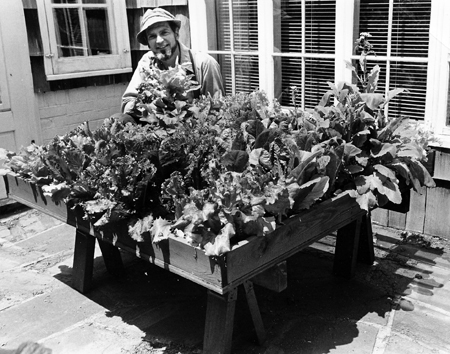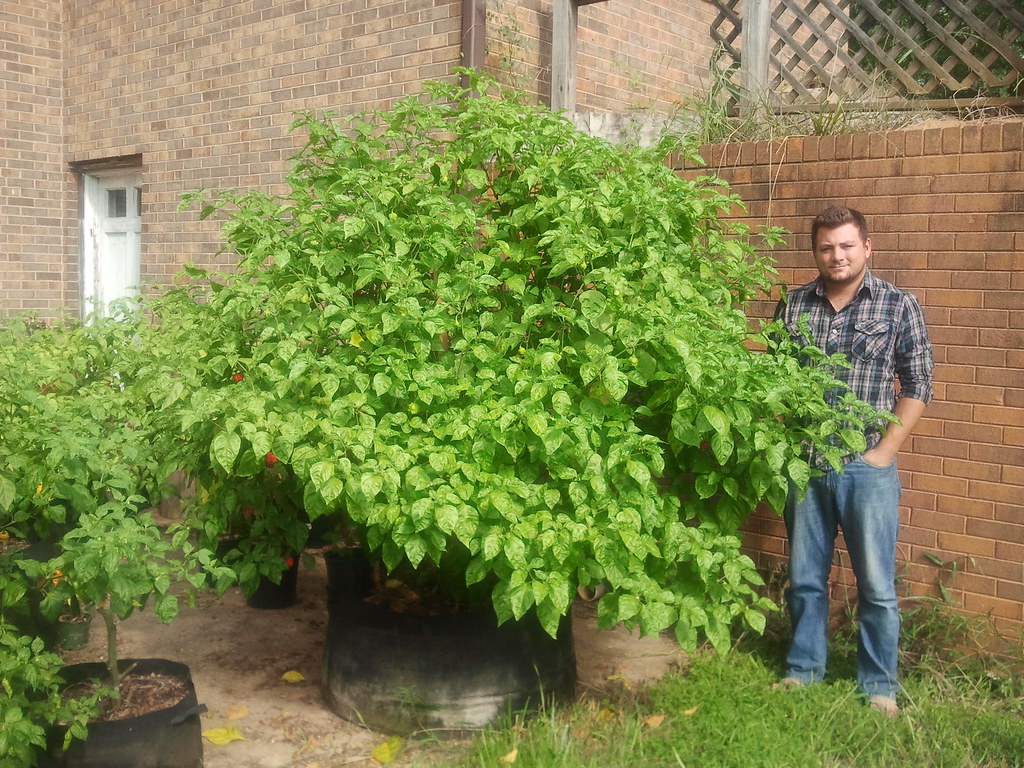-
If you need help identifying a pepper, disease, or plant issue, please post in Identification.
You are using an out of date browser. It may not display this or other websites correctly.
You should upgrade or use an alternative browser.
You should upgrade or use an alternative browser.
Putting Nutrition and Taste into our Peppers
- Thread starter MadDog
- Start date
Voodoo 6 said:Here is a little article on the benefits of molasses: http://maximumyield.com/blog/2014/04/01/feeding-your-garden-cane-molasses/
hope its informative, cheers!
Voodoo 6, thanks for the article, VERY informative and will put to good use. Much appreciated and helpful with the ACTUAL topic of this thread. I won't even accuse you of being a door to door salesman of powdered cane molasses. Note the article points out molasses contains almost no NPK and yet is being used as a "fertilizer".
Malarky said:maybe recharge your soil with compost?
This is the standard of course. My concern with this is I used "square foot gardening" guy's formula for making my soil. Third each of peat, vermiculite, and compost (5 kinds). But what about after first season if I want to reuse this labor intensive creation? If I mix in more compost, I no longer have my "third each" mixture. So now what. I'd really like to hear people's thoughts on this, how they handle the issue of changing the percentage in their mixture. Thanks.
But who can really quantify that? I'm all for organics, but I'm not really on board with the whole "high brix" thing yet, as it's still pretty unsubstantiated. Organics isn't just about white folks with dredlocks, paying too much for hip sounding veggies. It's about actually learning the science of growing, rather than just trusting somebody to tell you what to add, and when.I'm interested in how to increase nutrient density and flavor. Found this addendum to be interesting and wanted to share.
No offense, but when you put up a topic that reeks of behind the scenes kickbacks, and makes unorthodox claims, you have to accept a fair amount of skepticism. All things being fair, you invited the conversation, so you can't really make a stink about what you get. No expectations = no disappointment. From your counters, I'd say you were expecting a bit more validation than what you've received.Ever notice it's always the trolls that pop in and start slinging the "T" word?
You know that people are always going to be people, so allow for it in your dialogue. If this product is what you claim it to be, it will stand on its own, despite the skeptics.
as long as your medium has drainage, you basically can't go wrong with compost. Leaf mold, green manure crops, composted woodchips.MadDog said:
This is the standard of course. My concern with this is I used "square foot gardening" guy's formula for making my soil. Third each of peat, vermiculite, and compost (5 kinds). But what about after first season if I want to reuse this labor intensive creation? If I mix in more compost, I no longer have my "third each" mixture. So now what. I'd really like to hear people's thoughts on this, how they handle the issue of changing the percentage in their mixture. Thanks.
compost doesn't work when its in a puddle though
Myxlplyk said:Those are the composition of sea water at 3.5%. How difficult is it to test the actual stuff he's selling, and let us know that? Sounds as if someone was in too much of a hurry to do proper analysis on their product, and went by someone else's homework.
Uh, dude, that is the actual stuff "he's selling". And it's not a "he", it's a company that is also a pretty large operation. I think you were in too much of a hurry to actually look at their website, they've got information overload going on all over the place. They've got more info probably than any other seller I've ever seen. As far as going by someone else's homework, YES, they've plastered their site with that fact, they're using Murray's work for profit, which contrary to popular belief, "profit" is an awesome thing.
Myxlplyk said:I guarantee that if this stuff was all that back in the 30s, it would've been all that for the past 80 years.
One man started experimenting with an idea beginning in the 30s, had enough results to continue that work for 5 decades, and so far I've found over a half dozen companies around the world harvesting and selling sea mineral solids because of his work. Meanwhile, fertilizer is BIG business, the NPK boys have rammed down our throats that it is the ONLY path, so there is a huge bias to overcome in that industry.
Malarky said:as long as your medium has drainage, you basically can't go wrong with compost. Leaf mold, green manure crops, composted woodchips.
compost doesn't work when its in a puddle though
So are you saying that the compost can take the place of the peat and vermiculite, they each have their own functions as well don't they?
They have their place in container culture, and in helping to amend poor soil conditions by improving soil structure and drainage.
A good long read about improving your soil is http://thehotpepper.com/topic/44911-gurus-2016-peruvian-smugglegate-soil-is-life/
You wanna add some nutrition to your soil? Stick a Trout in a blender and then let it ferment in the sun for a couple days and pour that in your garden lol!
A good long read about improving your soil is http://thehotpepper.com/topic/44911-gurus-2016-peruvian-smugglegate-soil-is-life/
You wanna add some nutrition to your soil? Stick a Trout in a blender and then let it ferment in the sun for a couple days and pour that in your garden lol!
Malarky said:sea salt in Oklahoma isn't really natural either lol
True, but neither are the peppers I'm growing, lol.
Malarky said:
They have their place in container culture, and in helping to amend poor soil conditions by improving soil structure and drainage.
A good long read about improving your soil is http://thehotpepper.com/topic/44911-gurus-2016-peruvian-smugglegate-soil-is-life/
You wanna add some nutrition to your soil? Stick a Trout in a blender and then let it ferment in the sun for a couple days and pour that in your garden lol!
Mostly container is where I'm at. Wow, long read is right, but thanks for the link. There is a lot of good info in there. I'd love to have that type of operation but it's not in the cards for me at the present time. If I had organic chickens and rabbits running around, I'd definitely incorporate their "contributions". I do use Neptunes Fish & Seaweed. Why I'm pumped about the sea mineral solids is the fact that they've got EVERYTHING as far as minerals, so I don't need to worry about whether or not I'm missing some component. I also like the utility of it, how it can be used in all of the application ways. What I'm after is turning my peppers into a multi vitamin and mineral "pill".
Yeah I don't think pepper fruits actually accumulate a broad array of vitamins/nutrients.MadDog said:What I'm after is turning my peppers into a multi vitamin and mineral "pill".
They are not an ideal vehicle or pill. They deliver capsaicin Vitamin A+C
Sweet Red Bell's will deliver a big kick of Vitamin A and C with trace others...Jalapenos dramatically less...
Nutritional values of the obscure varieties we all love, likely won't be tested much.
Go with Pimenta de Neyde for anthocyanin?
Eat a balanced diet?
Malarky, when I say compost is the standard way, I don't mean that in a derogatory manner. I should have said it is THE gold standard way. The reason I follow Mel Bartholomew's method is because of this black and white photo below.
This is 4 inches deep and the soil consists entirely of blended compost. This was the beginnings of his formulation for his "Mel's Mix". See more at... http://www.melbartholomew.com/lush-garden-four-inches/ and http://www.melbartholomew.com/why-only-6-inches-of-soil/

This is 4 inches deep and the soil consists entirely of blended compost. This was the beginnings of his formulation for his "Mel's Mix". See more at... http://www.melbartholomew.com/lush-garden-four-inches/ and http://www.melbartholomew.com/why-only-6-inches-of-soil/

Malarky said:Yeah I don't think pepper fruits actually accumulate a broad array of vitamins/nutrients.
They are not an ideal vehicle or pill. They deliver capsaicin Vitamin A+C
Sweet Red Bell's will deliver a big kick of Vitamin A and C with trace others...Jalapenos dramatically less...
Nutritional values of the obscure varieties we all love, likely won't be tested much.
Go with Pimenta de Neyde for anthocyanin?
Eat a balanced diet?
Point well taken, but pills aren't an ideal vehicle either. The nutrients in them aren't in much of a usable form. I'm only half joking about turning my peppers into one-a-days. They surprisingly do contain a broad array, and it's not just peppers. Plenty of scientific experiments have been done showing that plants aren't selective about what they'll absorb. Give them toxic heavy metals and they'll slurp them up. So why not give them ALL of the minerals? I do grow/buy other staples and consume them, but maybe I'll start a cult where we just live off superhots, but I'll need a catchy name first.
Here's an interesting profile on black pepper that may surprise you... http://www.whfoods.com/genpage.php?tname=nutrientprofile&dbid=86
Malarky said:Lettuce will grow great in 4 inches of soil
Picture below lifted from GURU
Plenty of people have grown a lot more than shallow variety vegetables using Mel's methods with great success. That's an awesome photo. Now for the Debbie downer part, I'm hoping those are jute or they're not "organic", I corresponded with all of the fabric pot manufacturers early on in my search for safe container materials and could get NONE of them to confirm the plastic being used. They each said they "didn't know" and when pressed said they wouldn't take the time to find out for me. Hmmmm.
Shame too, because one of the largest manufacturers of these lives just a few miles north of me and I love to buy local when I can. I've settled on only HDPE when growing in plastic.
MadDog said:
Uh, dude, that is the actual stuff "he's selling". And it's not a "he", it's a company that is also a pretty large operation. I think you were in too much of a hurry to actually look at their website, they've got information overload going on all over the place. They've got more info probably than any other seller I've ever seen. As far as going by someone else's homework, YES, they've plastered their site with that fact, they're using Murray's work for profit, which contrary to popular belief, "profit" is an awesome thing.
One man started experimenting with an idea beginning in the 30s, had enough results to continue that work for 5 decades, and so far I've found over a half dozen companies around the world harvesting and selling sea mineral solids because of his work. Meanwhile, fertilizer is BIG business, the NPK boys have rammed down our throats that it is the ONLY path, so there is a huge bias to overcome in that industry.
So are you saying that the compost can take the place of the peat and vermiculite, they each have their own functions as well don't they?
Dude... I've been to the site. Nowhere on the actual site is a list of composition of nutes of the actual product. The only thing they have is seawater. Take away the actual water, and the % of everything else goes up. Now I want to know what that is... and they don't have it. If they did post it in some obscure corner of their site, I apologize in advance.
People aren't very specific either.MadDog said:Plenty of scientific experiments have been done showing that plants aren't selective about what they'll absorb. Give them toxic heavy metals and they'll slurp them up.
Here's an interesting profile on black pepper that may surprise you... http://www.whfoods.com/genpage.php?tname=nutrientprofile&dbid=86

What in particular is interesting in that Black Pepper Profile?
Chewing Black Pepper corns doesn't sound fun.
Malarky said:People aren't very specific either.
What in particular is interesting in that Black Pepper Profile?
Chewing Black Pepper corns doesn't sound fun.
The large number of minerals and amino acids present, and we don't know what medium this test was grown from, perhaps if it had been amended with more minerals, it would have contained many more.
MadDog said:
The large number of minerals and amino acids present, and we don't know what medium this test was grown from, perhaps if it had been amended with more minerals, it would have contained many more.
Calcium, Magnesium, Phosphorus, Potassium are the biggest. Those are essential for any plant, so I don't see why they're a problem. Chromium at .93 mg... that seems high for such an obscure metal.
There aren't surprising quantities of any mineral or amino acids in that profile.MadDog said:
The large number of minerals and amino acids present, and we don't know what medium this test was grown from, perhaps if it had been amended with more minerals, it would have contained many more.
They're called trace minerals for a reason. many become toxic in too high a concentration (like everything, the dose makes the poison)
You could take a drop of blood and probably have more amino acids than a similar portion of peppercorn.
Eat Meat Kids...
Myxlplyk said:
Dude... I've been to the site. Nowhere on the actual site is a list of composition of nutes of the actual product. The only thing they have is seawater. Take away the actual water, and the % of everything else goes up. Now I want to know what that is... and they don't have it. If they did post it in some obscure corner of their site, I apologize in advance.
They are selling dried SEA WATER, so yes "The only thing they have is seawater". I would honestly like to know the answer myself just for curiosity sake. Hopefully someone in here could answer this, it's probably a simple mathematical deduction. I'm thinking if these are the concentrates at 3.5%, then figure out what they are at (100%/3.5%) X each constituent.
Malarky said:There aren't surprising quantities of any mineral or amino acids in that profile.
They're called trace minerals for a reason.
You could take a drop of blood and probably have more amino acids than a similar portion of peppercorn.
Eat Meat Kids...
Be honest, those were your Twinkies you took a picture of weren't they? I didn't say large "quantities", I said large "number" as in variety.

